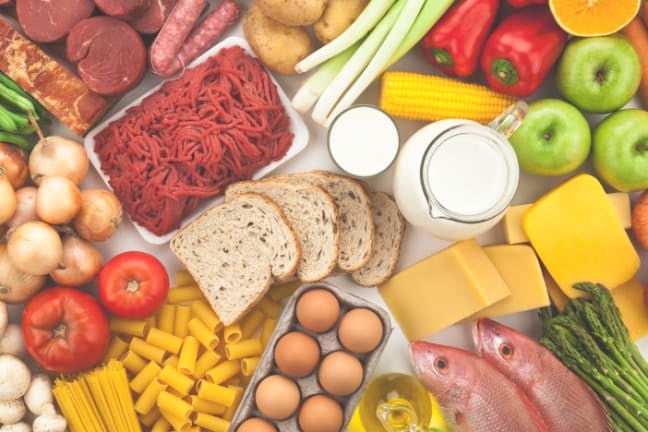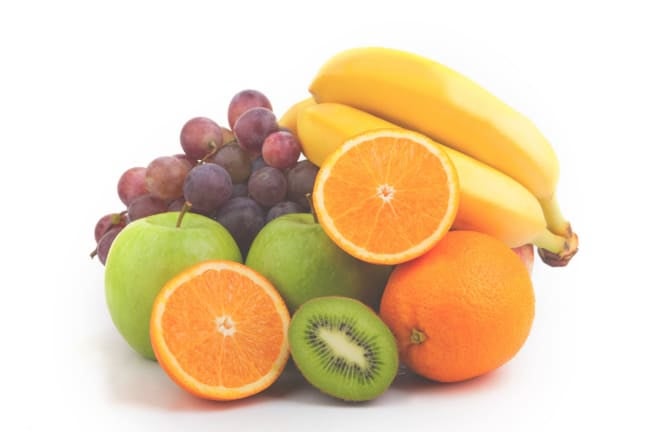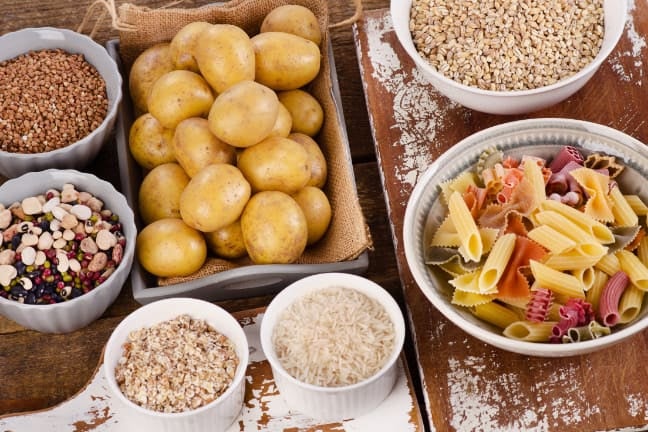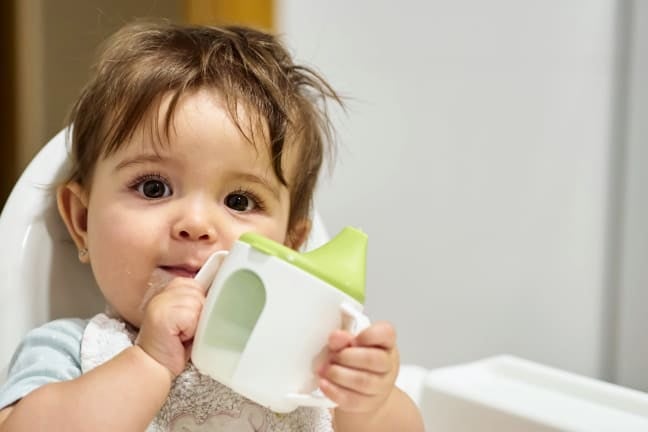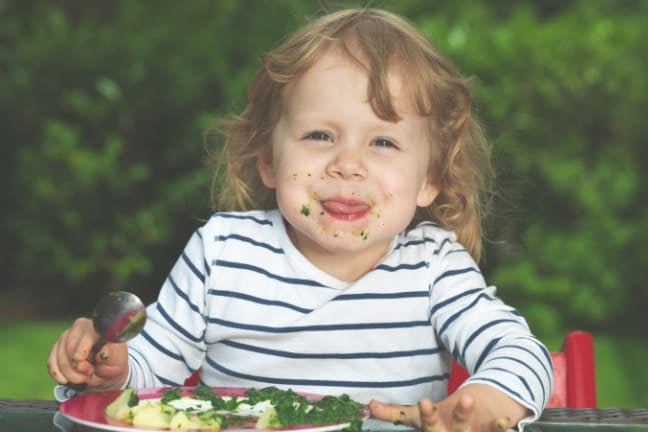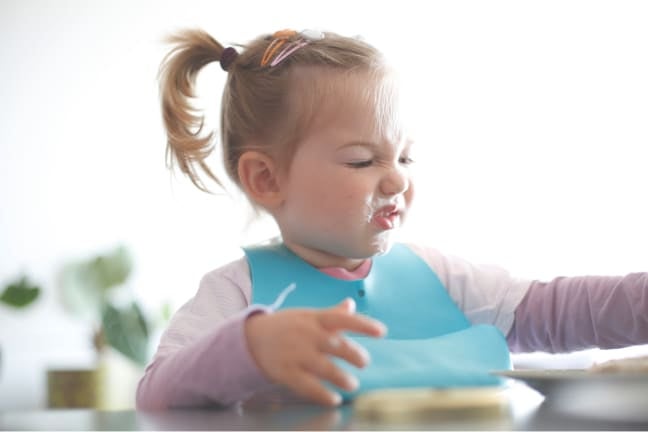Introduction
Now they’re ‘all grown up’ your toddler can eat the same food as the rest of the family – just in mini portions and remember not to add additional salt to their food.
Variety is key. They’ll need nutrients from each food group. A mix of meat (or if they are vegetarian tofu, beans or legumes), dairy, fruit, vegetables, and carbohydrates every day. A balanced and healthy diet for kids ensures they get enough energy and nutrients for development. Offering a variety of foods also exposes their tastebuds to essential nutrients and flavours. This article takes you through all the food groups and how much they should eat each day so you can give your toddler a healthy balanced diet. A weekly meal planner can really help too.
What is the correct portion size for a toddler?
After tripling their birth weight in the first year a child’s growth slows down, so the amount they eat does not need to be huge – roughly speaking about a quarter of an adult’s portion size. It is recommended that a toddler has 3 meals a day and 2-3 snacks per day but bear in mind a child’s appetite will vary day-to-day and meal-to-meal. The HSE provides the children’s food pyramid showing the variety of food and child size servings.
Milk and dairy for toddlers
Three servings of whole milk and full fat dairy for toddlers is recommended each day. Cow’s, goat’s and sheep’s milk, cheese, yoghurt and fromage frais all count. They’re a good source of energy and protein, with plenty of vitamins and minerals:
-
Calcium and vitamin D for those growing teeth and bones
-
Vitamin A to help the body’s immune system fight off colds
-
Riboflavin keeps your toddler’s eyes, skin and nervous system healthy
-
Vitamin B12 helps the body make red blood cells and keeps the nervous system healthy.
-
Magnesium for turning all that yummy food into energy
-
Potassium which controls the balance of fluid in the body and the correct functioning of the heart
Little tip: If your little one doesn’t like drinking milk, try sneaking it into mashed potato, pureed vegetables or porridge. Read our clever tricks to get your fussy eater to eat dairy.
Fruit and vegetables for toddlers
Everyone knows that fruit and vegetables for toddlers are an essential part of a healthy diet and should be part of every mealtime. Toddlers are already beginning to work out their tastes for the future so the sooner you get them to enjoy their veggies the better. Fruit and vegetables are recommended each day, for 1 to 2 year olds 2 to 3 servings per day and for 3 to 4 year olds it’s 4 to 5 servings per day.
-
Fruit & veg provide vitamins A and C, fibre and some B vitamins
-
An apple a day. Or could it be a pear? Different fruits and vegetables contain different vitamins and minerals, so variety is not just important but vital
-
Make life easier. Sometimes you’re so busy you just need to grab something quick for baby. Frozen, juiced, canned (in juice, not syrup) or dried fruit and veg can be your life saver
-
Vegetarian? Your baby could take vitamin C to help their iron absorption
Little tip: Some tots will make a yukky face at the sight of a vegetable, so try offering small amounts to get them used to it. You can also try hiding them in their favourite meals – pureed vegetables in a pasta sauce are a brilliant trick. Growing your own – with your toddler’s help – can also be a fun way to get them to try new things.
Protein for toddlers
Protein is recommended each day, for 1 to 2 year olds 2 servings a day and for 3 to 4 year olds it’s 3 to 4 servings per day. Vegetarians will need an extra portion to ensure they have enough amino acids in their diet. Meat, fish, eggs and vegetarian alternatives, like pulses, are good sources of protein and other nutrients, for example:
-
Iron, which helps with cognitive development
-
Zinc, magnesium and B vitamins
Not keen on feeding baby too much red meat? You could mix it up with other proteins or iron-rich foods, like fortified breakfast cereal, dark green vegetables, dried apricots, figs and almonds.
Little tip: Your toddler might find chewy pieces of meat a little hard to swallow, so maybe add tiny pieces of chicken or meat to yummy favourites like macaroni cheese or pasta sauce.
Fish for toddlers
Fish is a good source of protein, vitamins and minerals. Try putting oily fish such as salmon, sardines or tuna on the menu once to twice a week. Here’s why:
-
Vitamins and minerals. Fish contains zinc, selenium, calcium and phosphorus which are essential for healthy development
-
Heart food. Oily fish are particularly high in long-chain omega-3 fatty acids that support a healthy heart
Do remember that you can give boys up to 4 portions of oily fish a week, but girls no more than twice a week.
Not all fish is good for baby. Avoid shark, swordfish and marlin as these are high in mercury and can affect the development of their delicate nervous system.
Little tip: If your toddler isn’t much of a fish fan yet, try toning it down. A fish pie topped with mash potato, or maybe tinned tuna with tomato pasta?
Starch and carbohydrates for toddlers
Bread, cereal, potatoes and pasta: most kids love them and they’re a good source of energy. These starchy foods provide fibre and some B vitamins which are needed to convert food into energy. Foods containing starch and carbohydrates are recommended each day, for 1 to 2 year olds 3 to 4 servings a day and for 3 to 4 year olds it’s 4 to 6 servings per day.
It’s good to serve toddler-sized portions of carbs at every meal and as a snack now and then. Wholegrain carbs, not so much. Brown rice for example, is good for them but can bulk up their little tums, leaving no room for other goodness. Best to give your under two’s a mix of both.
Porridge is a healthy breakfast for toddlers as most fortified porridge contains iron. Iron contributes to normal cognitive development in toddlers. You should look out for porridge which has 2.5 mg per serving of iron such as Cerelac® Honey and Wheat with Milk.
Some fat is good for toddlers
During toddlerhood, high fat foods are not only ok but encouraged. As growing little people, they need the concentrated energy and other nutrients provided by full fat whole milk, yoghurt, and cheese. Here’s why:
-
Unique vitamins - Some vitamins such as A and D are only found in fats
-
Absorbing goodness - Fat in the diet helps the body absorb certain nutrients found in vegetables like lycopene and beta-carotene
-
Fatty acids - It also provides essential fatty acids that the body can't make itself
But not all fats are created equal. The unsaturated fats from vegetable sources, like cooking oil, are better than the saturated fats found in meat. Here’s a few easy ways to keep saturated fat low in your diet:
-
Keep it lean - buy leaner cuts of meat
-
Fewer ‘frydays’ - buy leaner cuts of meat
-
A few drops - use as little cooking oil as possible
-
Go easy on the crisps - limit fried foods, pastry and commercially prepared cakes and biscuits to special occasions
Little Tip: Low fat can often mean high sugar, not to mention other artificial flavourings. Low fat commercial foods may not have enough of the good calories your growing toddler needs, so it’s probably best to steer clear.
Healthy snacks for toddlers
Toddlers only have small tummies, so regular snacks between meals prevents them from getting overly hungry or going too long before eating. A recommended daily routine includes two to three healthy snacks for toddlers per day. Fit them in around meals and nap times.
Little mouths love sweet treats, but these are more likely to cause tooth decay and may lack important vitamins and minerals. So, limit sugar-containing foods and drinks between meals. And swap unhealthy snacks for more nutritious ones, like fresh fruit, vegetable sticks, natural yoghurts, fruit puree lollies, and cheese. Find some healthy snack ideas in our meal planner.
Drinks for toddlers
Growing up is thirsty work – literally. Toddlers should have six to eight drinks per day, each of about 100-120ml. Give them more if they’re being extra active or it’s a hot day. The best drinks are water and unflavoured milk, which are kinder to teeth than sugary drinks. Here’s a few of the wonders of water:
-
Fluid balance - water keeps all the body’s fluids nicely balanced
-
Packs a punch - water gives little muscles energy to explore their world
-
Kind to kidneys - the kidneys balance the body’s fluids, which they can’t do without water
-
Clear waste - water helps remove waste from your blood in the form of urine and helps with normal bowel function
Everyone knows natural, not-from-concentrate, fruit juices like orange juice, are a good source of vitamin C. But did you know they also contain high levels of natural sugars and acids which can cause tooth decay? Squash or cordial also contains added sugar and very few nutrients. Too many juice-based or flavoured drinks can be filling, leaving less room for healthy food choices.
Little Tip: Diluting juice and squash, or cordial – one part to 10 with water, will make them less sugary but should be limited to mealtimes to help protect teeth from dental erosion. Fortified drinks such as SMA® Toddler Milk are nutritionally tailored for young children and contains 100%* of vitamins C & D* and is enriched with Vitamin A and iron.
*400ml daily intake of SMA® Toddler milk delivers 100% of toddlers daily recommended amount of vitamins C & D
Does my toddler need supplements?
Growing children sometimes don’t get enough vitamins A, C and D, particularly if they’re fussy and don’t have a varied diet. If you are breastfeeding or your baby is taking less than 300ml of infant formula a day then you will need to give your baby 5 micrograms of Vitamin D3 as a supplement every day from birth to 12 months. Here’s why:
-
Vitamin A helps strengthen your toddler’s immune system and helps maintain healthy skin
-
Vitamin C helps your toddler’s body absorb iron and helps with the normal function of the immune system
-
Vitamin D helps the body absorb calcium from the foods we eat — which is great when your toddler’s bones are growing quickly in the early years.
Too much of some vitamins can be harmful, so try to keep to the recommended dose.
Fortified foods like cereals and Toddler Milks can also help to provide the extra vitamins needed at this age.
Should I reduce added sugar for my toddler?
There are two types of sugar: natural sugars found in whole fruits, vegetables and milk; and the added sugar in fizzy drinks and biscuits. The natural sugars provide energy, but the foods they’re in also provide other important nutrients such as vitamins, minerals and fibre.
Food with lots of added sugar provides energy but often has fewer nutrients, so it’s best to use as an occasional treat rather than an everyday snack.
Sugary foods and drinks can cause tooth decay, particularly if eaten between meals. So, if you’re giving them a sweet treat it’s best to do it with their meals. The more they chew, the more saliva they produce, which helps neutralise the acids that could harm their teeth. It is advised that children under 3 should have their teeth brushed twice daily for about 2 minutes with a fluoride toothpaste.
Fluorides in water can help prevent tooth decay. It’s best to use a cup, beaker or a straw for drinks rather than a bottle. Lastly, cleaning your toddler’s teeth before bed is a very important habit to get into.
Fostering healthy eating habits in toddlers lays the foundation for their wellbeing. By offering them a variety of nutrient-rich foods, encouraging positive experiences at their mealtimes, alongside being supportive of them trying new and interesting foods, you can help to support their growth and development. Consistency and patience are key, so with thoughtful guidance and encouragement, you can help your little one build a happy relationship with food.




